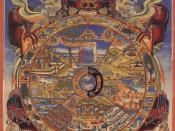The direct translation of Karma, a Sanskrit word, is "action." However, action is not substituted for karma, as karma carries much more weight than the simple understanding found in action. Karma is one of the most popular and perhaps least understood concepts in Buddhism. Every action has a reaction equal to or greater than the action. In Buddhist thought, karma is an action directly or indirectly produced by movement of the individual mind, a mind motivated by conceptual thoughts and emotions. It is produced by an intentional act arising from anger, attachment, or jealousy, the emotions that manipulate the movements of the mind and our ways of thinking. Our actions arise from our mind, speech and body. When actions are produced, they leave imprints behind on our mind stream (Topgyal). "In the West, karma has often been misinterpreted as 'an eye for an eye,' the retaliatory principle that you are punished with the same punishment you inflict on another" (Reichenbach).
However, this is a misconception and misunderstanding of the Buddhist meaning of karma. According to the Buddha's teaching, you are not made to pay for past mistakes, nor are you rewarded for your past good deeds - but you are, in fact, what you do or intend to do. More to the point, karma is the process by which your actions shape your life.
In Buddhist cosmology, the origin, structure and processes of the universe, there is a view of time that is cyclical. The universe and all things in it go through great periods of evolution and dissolution. In this system we can speak about a creation, not the creation. Time is thought to take place according to the great world cycles of time, which are called the Four Great Ages. The universe is conceived as having a cyclical...


